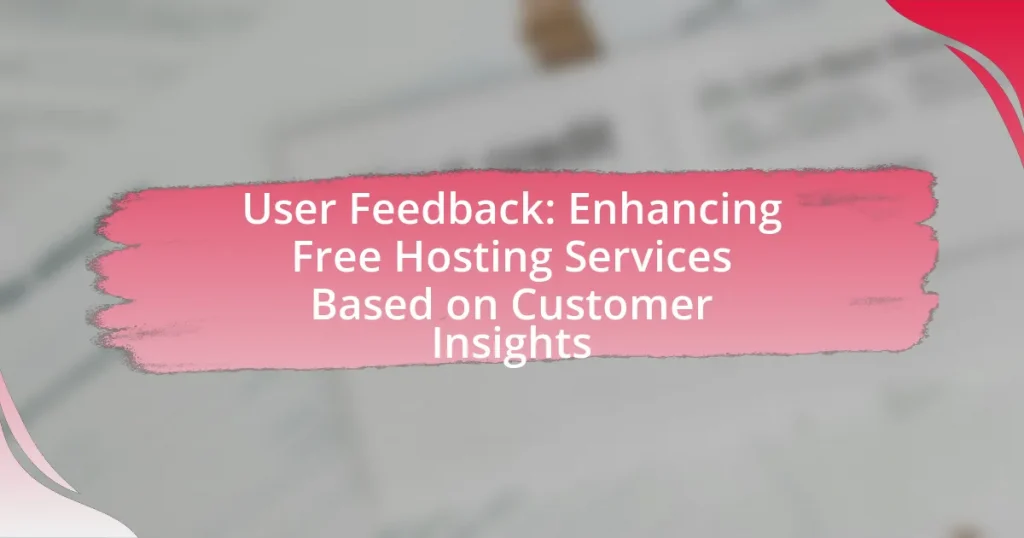The article focuses on the best free hosting platforms for e-commerce websites, highlighting options such as Shopify, WooCommerce, Wix, and Weebly. It examines how these platforms support e-commerce through essential features like website builders, payment processing, and security measures, while also discussing the limitations of free hosting compared to paid options. Key considerations for evaluating these platforms include reliability, scalability, security, and customer support. The article further explores strategies for optimizing performance and user experience on free hosting platforms, as well as the potential pitfalls and long-term financial implications associated with using free hosting for e-commerce.

What are the Best Free Hosting Platforms for E-commerce Websites?
The best free hosting platforms for e-commerce websites include Shopify, WooCommerce, and Wix. Shopify offers a free trial that allows users to set up an online store with various e-commerce features, while WooCommerce is a free plugin for WordPress that enables e-commerce functionality on existing WordPress sites. Wix provides a free plan that includes e-commerce capabilities, although it may have limitations on features and storage. These platforms are widely recognized for their user-friendly interfaces and essential e-commerce tools, making them suitable for small businesses and startups looking to establish an online presence without initial costs.
How do free hosting platforms support e-commerce websites?
Free hosting platforms support e-commerce websites by providing essential features such as website builders, payment processing integrations, and basic security measures. These platforms often include user-friendly interfaces that allow entrepreneurs to create and manage online stores without extensive technical knowledge. For instance, platforms like Wix and Shopify offer templates specifically designed for e-commerce, enabling users to showcase products effectively. Additionally, many free hosting services facilitate payment gateways like PayPal or Stripe, allowing for secure transactions. According to a report by Statista, over 20% of small businesses utilize free hosting solutions, demonstrating their role in enabling e-commerce accessibility for startups and small enterprises.
What features should e-commerce websites look for in free hosting platforms?
E-commerce websites should look for features such as reliable uptime, sufficient bandwidth, and security measures in free hosting platforms. Reliable uptime ensures that the website remains accessible to customers, which is crucial for sales; platforms like WordPress.com report 99.9% uptime. Sufficient bandwidth is necessary to handle traffic, especially during peak shopping times, as inadequate bandwidth can lead to slow loading times and potential loss of sales. Security measures, including SSL certificates and regular backups, protect sensitive customer data, which is essential for maintaining trust and compliance with regulations like GDPR.
How do free hosting platforms compare to paid options for e-commerce?
Free hosting platforms generally offer limited features and resources compared to paid options for e-commerce. While free hosting may attract users with no upfront costs, it often lacks essential functionalities such as custom domain names, advanced security measures, and reliable customer support, which are critical for e-commerce success. For instance, a study by HostingAdvice found that 70% of e-commerce businesses using free hosting experienced downtime, negatively impacting sales and customer trust. In contrast, paid hosting services typically provide better performance, scalability, and security, which are vital for handling transactions and protecting sensitive customer data.
What are the top free hosting platforms available for e-commerce?
The top free hosting platforms available for e-commerce are Shopify, WooCommerce on WordPress, Wix, and Weebly. Shopify offers a free trial that allows users to set up an online store with various e-commerce features. WooCommerce, a plugin for WordPress, enables e-commerce functionality on a WordPress site at no cost, although hosting fees may apply. Wix provides a free plan that includes e-commerce capabilities, while Weebly also offers a free tier with basic e-commerce features. These platforms are widely recognized for their user-friendly interfaces and essential tools for online selling.
What are the strengths and weaknesses of each platform?
The strengths and weaknesses of various free hosting platforms for e-commerce websites vary significantly. For instance, Shopify offers a user-friendly interface and extensive app integrations, but its free plan is limited in features and branding options. WooCommerce, integrated with WordPress, provides flexibility and a vast range of plugins, yet it requires more technical knowledge to set up and manage effectively. Wix is known for its drag-and-drop builder and visually appealing templates, but it has limitations on e-commerce functionalities in its free version. Finally, Weebly is easy to use and includes built-in e-commerce tools, but it lacks advanced features and customization options compared to paid platforms. Each platform’s strengths and weaknesses are crucial for users to consider based on their specific e-commerce needs.
How do user reviews and ratings influence the choice of platform?
User reviews and ratings significantly influence the choice of platform by providing potential users with insights into the experiences of others. These reviews often highlight the strengths and weaknesses of a platform, allowing users to make informed decisions based on real-world feedback. For instance, a study by BrightLocal found that 91% of consumers read online reviews, and 84% trust them as much as personal recommendations. This indicates that positive reviews can enhance a platform’s credibility, while negative ratings can deter users from selecting that platform. Therefore, user-generated content plays a crucial role in shaping perceptions and guiding choices in the competitive landscape of e-commerce hosting platforms.
What criteria should be used to evaluate free hosting platforms for e-commerce?
To evaluate free hosting platforms for e-commerce, consider criteria such as reliability, scalability, security, ease of use, and customer support. Reliability ensures that the platform has minimal downtime, which is crucial for maintaining sales and customer trust. Scalability allows the platform to grow with your business, accommodating increased traffic and product listings without performance issues. Security is vital for protecting sensitive customer data and transactions; look for features like SSL certificates and compliance with data protection regulations. Ease of use refers to the platform’s user interface and the availability of tools for managing products, payments, and shipping efficiently. Lastly, customer support is important for resolving issues quickly; check for availability of support channels like live chat, email, or phone assistance. These criteria collectively help in selecting a free hosting platform that can effectively support an e-commerce business.
How important is uptime and reliability for e-commerce hosting?
Uptime and reliability are critical for e-commerce hosting, as they directly impact a website’s availability and performance. A study by Gartner indicates that even a one-hour outage can cost an online retailer up to $100,000 in lost sales, highlighting the financial implications of downtime. Furthermore, consistent uptime fosters customer trust and satisfaction, which are essential for repeat business. According to a report by Statista, 79% of online shoppers who experience performance issues are less likely to return to the site, underscoring the importance of reliable hosting solutions for maintaining customer loyalty and revenue.
What role does customer support play in choosing a hosting platform?
Customer support is crucial in choosing a hosting platform as it directly impacts user experience and problem resolution. Effective customer support ensures that users can quickly address technical issues, receive guidance on platform features, and obtain assistance during critical times, such as website downtime. Research indicates that 70% of customers are willing to pay more for better customer service, highlighting its importance in decision-making. Additionally, platforms with robust customer support often receive higher satisfaction ratings, which can influence potential users’ choices.
How can businesses transition from free to paid hosting platforms?
Businesses can transition from free to paid hosting platforms by evaluating their current needs, selecting a suitable paid hosting provider, and migrating their website content. First, businesses should assess their website traffic, storage requirements, and desired features, as free hosting often lacks scalability and support. Next, they should choose a paid hosting service that aligns with their needs, considering factors such as uptime reliability, customer support, and pricing plans. Finally, businesses must back up their existing data, set up the new hosting account, and transfer their website files and databases to ensure a smooth transition. This process is validated by the fact that many successful e-commerce platforms, such as Shopify and WooCommerce, recommend upgrading to paid hosting to enhance performance and security.
What are the common pitfalls to avoid when using free hosting for e-commerce?
Common pitfalls to avoid when using free hosting for e-commerce include limited bandwidth, lack of customer support, and security vulnerabilities. Limited bandwidth can lead to slow loading times and downtime during high traffic, negatively impacting user experience and sales. The absence of reliable customer support can hinder problem resolution, leaving businesses vulnerable during critical moments. Additionally, free hosting often lacks robust security measures, increasing the risk of data breaches and compromising customer information. These factors can significantly affect the credibility and functionality of an e-commerce site, ultimately impacting revenue and customer trust.

What are the limitations of free hosting platforms for e-commerce?
Free hosting platforms for e-commerce have several limitations, including lack of scalability, limited storage and bandwidth, and absence of customer support. These platforms often restrict the growth potential of an online store, as they may not handle increased traffic or product listings effectively. Additionally, free hosting typically offers minimal storage space and bandwidth, which can hinder the performance of e-commerce sites, especially during peak shopping times. Furthermore, the lack of dedicated customer support can lead to prolonged downtimes and unresolved technical issues, negatively impacting the user experience and sales.
How do bandwidth and storage limitations affect e-commerce operations?
Bandwidth and storage limitations significantly hinder e-commerce operations by restricting website performance and data management capabilities. Insufficient bandwidth can lead to slow loading times, resulting in a poor user experience and increased bounce rates; studies show that a one-second delay in page load time can reduce conversions by 7%. Additionally, limited storage affects the ability to host product images, customer data, and transaction records, which can compromise inventory management and customer service. For instance, e-commerce platforms often require substantial storage for high-resolution images and videos, and inadequate storage can lead to data loss or the inability to scale operations effectively.
What are the implications of limited customization options?
Limited customization options can significantly hinder the user experience and brand differentiation for e-commerce websites. When platforms restrict customization, businesses may struggle to create a unique identity, leading to a generic appearance that fails to attract customers. Research indicates that 75% of consumers judge a company’s credibility based on its website design, highlighting the importance of customization in establishing trust and engagement. Furthermore, limited options can restrict functionality, preventing businesses from implementing features that cater to their specific audience needs, ultimately impacting sales and customer satisfaction.
How can security concerns impact e-commerce websites on free hosting?
Security concerns can significantly impact e-commerce websites on free hosting by exposing them to vulnerabilities such as data breaches and malware attacks. Free hosting services often lack robust security measures, making it easier for cybercriminals to exploit weaknesses. For instance, a study by the Ponemon Institute found that 60% of small businesses that experience a data breach go out of business within six months, highlighting the severe consequences of inadequate security. Additionally, free hosting platforms may not provide SSL certificates, which are essential for encrypting sensitive customer information during transactions, further increasing the risk of data theft.
What are the potential costs associated with free hosting platforms?
Free hosting platforms can incur hidden costs such as limited bandwidth, lack of customer support, and potential downtime. These platforms often impose restrictions on storage and data transfer, which can lead to additional charges if users exceed these limits. Furthermore, the absence of professional support may result in increased operational costs due to troubleshooting and maintenance challenges. Additionally, free hosting services may display ads on users’ websites, which can detract from the user experience and potentially impact revenue generation.
How can hidden fees affect the overall cost of using free hosting?
Hidden fees can significantly increase the overall cost of using free hosting by introducing unexpected expenses that users may not initially anticipate. For instance, while a hosting service may advertise itself as free, it may charge for essential features such as domain registration, SSL certificates, or increased bandwidth, which can lead to costs that accumulate over time. According to a study by HostingAdvice, nearly 70% of users reported encountering hidden fees with free hosting services, which can ultimately negate the perceived savings of opting for a free plan.
What are the long-term financial implications of starting with free hosting?
Starting with free hosting can lead to significant long-term financial implications, primarily due to limitations in scalability, performance, and branding. Free hosting often lacks essential features such as custom domain names, which can hinder professional image and customer trust, potentially resulting in lower conversion rates and revenue. Additionally, as a business grows, the need for more resources may require migrating to paid hosting, which can incur costs related to data transfer, downtime, and potential loss of SEO rankings. Research indicates that businesses that invest in reliable hosting solutions experience up to 50% higher customer retention rates, underscoring the financial benefits of choosing paid options from the outset.

How can businesses maximize their success on free hosting platforms?
Businesses can maximize their success on free hosting platforms by optimizing their website for user experience and search engine visibility. This includes selecting a responsive design, ensuring fast loading times, and utilizing SEO best practices to enhance discoverability. According to a study by Google, 53% of mobile users abandon sites that take longer than three seconds to load, highlighting the importance of speed. Additionally, businesses should leverage social media integration and email marketing to drive traffic to their free-hosted sites, as platforms like Facebook and Instagram can significantly increase visibility and engagement. By focusing on these strategies, businesses can effectively utilize free hosting platforms to reach a broader audience and improve their overall performance.
What strategies can enhance performance on free hosting platforms?
To enhance performance on free hosting platforms, optimizing website speed and resource usage is essential. Implementing techniques such as image compression, minimizing HTTP requests, and utilizing browser caching can significantly improve loading times. For instance, studies show that a one-second delay in page load time can lead to a 7% reduction in conversions, highlighting the importance of speed in e-commerce. Additionally, using a Content Delivery Network (CDN) can distribute content more efficiently, reducing latency and improving user experience. These strategies collectively contribute to better performance on free hosting platforms, making them more viable for e-commerce websites.
How can businesses optimize their website for better user experience?
Businesses can optimize their website for better user experience by ensuring fast loading times, intuitive navigation, and mobile responsiveness. Fast loading times are crucial; studies show that 47% of users expect a webpage to load in two seconds or less, and a one-second delay can lead to a 7% reduction in conversions. Intuitive navigation helps users find information quickly, which can be achieved through clear menus and a logical page structure. Mobile responsiveness is essential as over 50% of web traffic comes from mobile devices; a responsive design ensures that users have a seamless experience regardless of the device they use. Implementing these strategies can significantly enhance user satisfaction and engagement on e-commerce websites.
What marketing techniques can drive traffic to e-commerce sites on free hosting?
Utilizing social media marketing, search engine optimization (SEO), and content marketing can effectively drive traffic to e-commerce sites on free hosting. Social media platforms like Facebook, Instagram, and Pinterest allow businesses to reach a broad audience through organic posts and targeted ads, which can significantly increase visibility. SEO techniques, such as optimizing product descriptions and using relevant keywords, enhance search engine rankings, making it easier for potential customers to find the site. Content marketing, including blog posts and videos related to products, can engage users and encourage sharing, further amplifying traffic. According to a HubSpot report, companies that prioritize blogging are 13 times more likely to achieve a positive ROI, demonstrating the effectiveness of these techniques in driving traffic.
What best practices should be followed when using free hosting for e-commerce?
When using free hosting for e-commerce, prioritize security, reliability, and scalability. Security is crucial; ensure that the hosting provider offers SSL certificates and regular backups to protect customer data and transactions. Reliability is essential; choose a platform with minimal downtime and good performance metrics, as e-commerce sites require consistent availability to maintain sales. Scalability is important; select a host that allows for easy upgrades as your business grows, ensuring that you can handle increased traffic without service interruptions. According to a 2021 study by Statista, 29% of online shoppers abandon their carts due to website performance issues, highlighting the need for a dependable hosting solution.
How can regular backups protect e-commerce data on free hosting?
Regular backups protect e-commerce data on free hosting by ensuring that critical information, such as customer details, transaction records, and product inventories, can be restored in case of data loss or corruption. Free hosting platforms often lack robust security measures and may experience downtime or data breaches, making backups essential for data integrity. For instance, a study by the Ponemon Institute found that 60% of small businesses that experience data loss close within six months, highlighting the importance of having a reliable backup strategy. Regularly scheduled backups mitigate the risk of losing valuable e-commerce data, allowing businesses to recover quickly and maintain operations.
What are the essential security measures for e-commerce websites on free hosting?
Essential security measures for e-commerce websites on free hosting include implementing SSL certificates, using secure payment gateways, regularly updating software, and employing strong password policies. SSL certificates encrypt data transmitted between users and the website, protecting sensitive information such as credit card details. Secure payment gateways ensure that transactions are processed safely, reducing the risk of fraud. Regular software updates patch vulnerabilities that could be exploited by attackers, while strong password policies help prevent unauthorized access to accounts. According to a 2021 report by Cybersecurity Ventures, e-commerce sites are increasingly targeted, making these measures critical for safeguarding customer data and maintaining trust.
What are the key takeaways for choosing the right free hosting platform for e-commerce?
When choosing the right free hosting platform for e-commerce, prioritize reliability, scalability, and security. Reliable platforms ensure minimal downtime, which is crucial for maintaining sales and customer trust. Scalability allows your e-commerce site to grow without needing to switch providers, accommodating increased traffic and product listings. Security features, such as SSL certificates and data protection measures, are essential to safeguard customer information and comply with regulations. For instance, platforms like WooCommerce on WordPress offer robust features and a large community for support, while Shopify provides a user-friendly interface with built-in security measures. These factors collectively enhance the overall performance and credibility of your e-commerce business.















